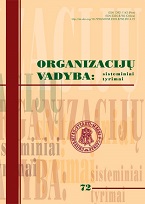Darbo ir šeimos konfliktas: individualių ir organizacinių veiksnių svarba
Work and family conflict: the role of individual and organizational factors
Author(s): Vilius ČESNAUSKAS, Jurgita Lazauskaitė-ZabielskėSubject(s): Economy
Published by: Vytauto Didžiojo Universitetas
Keywords: Darbo ir šeimos konfliktas; Vadovo ir organizacijos parama šeimai; Darbo ir šeimos konflikto sprendimo saviveiksmingumas Work and family conflict; Perceived family supportive organization; Perceived family supportive supervisor; Self-efficacy for managin
Summary/Abstract: Straipsnyje pristatomas tyrimas, nagrinėjantis organizacijos ir vadovo paramos šeimai sąsajas su darbo ir šeimos konfliktu bei darbuotojo darbo–šeimos konflikto sprendimo saviveiksmingumo vaidmenį jose. Aptariami tyrimo ribotumai ir praktinės rezultatų pritaikymo galimybės. Nowadays both partners in the family are working and aiming to pursue a career, thus it becomes increasingly difficult to balance between work and family life, which in turn often results in a conflict between work and family. Existing studies show work and family conflict to be related to job and family dissatisfaction, reduced job performance, decreased well-being, etc. (Warner, Hausdorf, 2009; Zhang et al., 2012) suggesting that it is important to search for factors that may reduce such conflict. Research on organizational factors show that perceived support from organization and supervisor are associated with less conflict between work and family (Allen, 2001; Hammer et al., 2009), however, only organizational attempts to reduce work and family conflict may not be sufficient (Rotondo, Kincaid, 2008). Therefore, the studies aimed at examining individual factors are needed. Moreover, there is a lack of research focusing on family area specific factors, such as family supportive supervisor or organization. Therefore, the study was conducted to explore the relationships between work and family conflict and perceived organizational and supervisory support, and the role of self-efficacy for managing work and family conflict. 201 employees were surveyed. The sample consisted of 58 (29 %) men and 143 (71 %) women, aged from 19 to 72 years with mean age of 34 years. 33.8 % of the respondents indicated that their organizations offered family friendly benefits, 45.3 % did not know about them. The main variables of the study that were measured included work-family and family-work conflict, support for family from supervisor and organization, and self-efficacy for managing work-family and family-work conflict.
Journal: Organizacijų vadyba: sisteminiai tyrimai
- Issue Year: 2014
- Issue No: 72
- Page Range: 23-43
- Page Count: 20
- Language: Lithuanian

